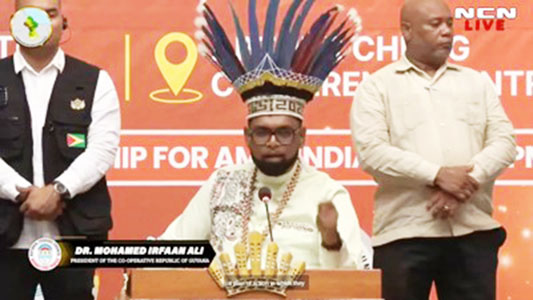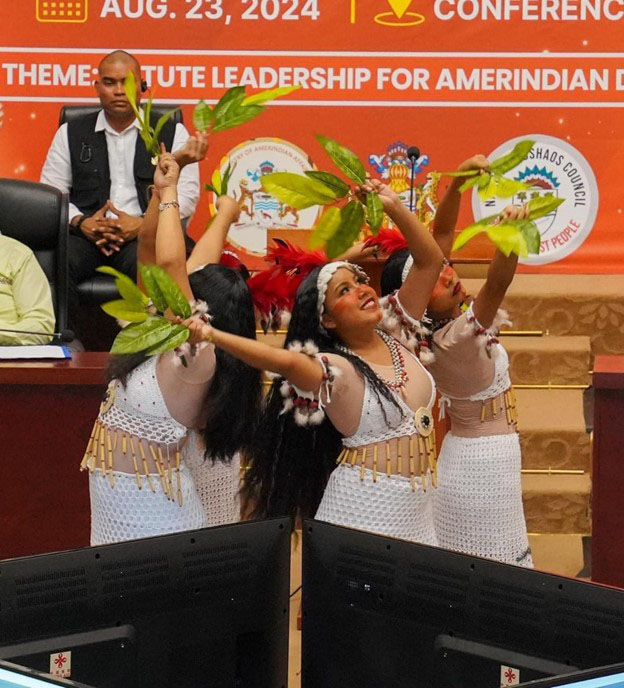By Khadidja Ba
Following a moment of silence to honour Guyanese legend Dave Martins, President Irfaan Ali launched into a dynamic 30-minute, campaign-style speech at the opening of the National Toshaos Council Conference 2024 at the Arthur Chung Conference Centre, Liliendaal, yesterday.
Speaking of the “significant strides” made under his administration in improving the rights and development of indigenous communities in Guyana, he highlighted increased budget allocations, enhanced land titling, and various developmental programmes, contrasting these achievements with the previous administration’s record.

Amid his passionate delivery, Ali announced that this year, indigenous communities would receive 26.5% of Guyana’s earnings from carbon credits — a notable increase from the usual 15%. This allocation, amounting to US$23.2 million or $4.84 billion, will be directly transferred to indigenous villages, marking a major milestone.
Ali also addressed land titling with similar enthusiasm, revealing that nearly 8,700 Amerindians had received legal title to their lands under his administration, which he said was a significant improvement compared to the stagnation from 2015 to 2020 under the APNU-AFC government.
‘Fiery and politically intense’
But even as the Head of State waxed lyrical about his administration’s contribution to the Amerindian community, in an exclusive interview with Stabroek News, Toshao Romario Hastings expressed frustration about not receiving the conference’s agenda in a timely manner. He noted that the morning’s agenda was only circulated by 9:30 am, leaving attendees with little opportunity to prepare. “This isn’t the first conference, so something as crucial as the agenda should have been sorted out in advance,” he said. “We were told printing was an issue, but if that was the case, they should have sent an e-copy.” The full agenda was only provided in the afternoon, which Hastings found unacceptable.
He also criticised the President’s presentation, describing it as fiery and politically intense. “As a young leader, I don’t look forward to this kind of aggressive rhetoric,” Hastings said. “There are appropriate venues for such political campaigns, and the speech felt like a constant attack on the APA [Amerindian People’s Association] and the opposition party. The repetition made it feel like the whole speech was summed up in what I just said. I hoped for a better approach, especially since we were engaging with indigenous leaders. Instead, it felt like unnecessary hostility.”
On a positive note, Hastings acknowledged the announcement regarding funding. “Although it’s not really an increase, since we expected less this time around, the adjustment means we ended up with the same amount as before. I still believe indigenous people should have had a chance to negotiate a better deal than the 15% offered.” He said he also appreciated the consideration of allowing communities to handle smaller contracts, such as those for bridges and other projects, which could provide additional income for the villages.
However, Hastings expressed disappointment at what he perceived as political control over the process. “The outcome was as predicted, and I’m not surprised but disappointed by the clear political influence within the National Toshaos Council. There are several irregularities that we need to address with the new council, hoping they will revisit the process to ensure proper representation and sufficient time for toshaos. There was evident political interference from the start, which wasn’t unexpected. We’ll have to work with the team and respect the outcome, but the process leaves much to be desired.”
Hastings concluded by emphasising his desire for a more independent process. “My greatest hope is for future conferences to be facilitated by an independent returning officer, rather than a political entity like an REO [Regional Executive Officer]. The deliberate efforts to influence today’s outcome were clear and concerning.”
Special invitee Kyle Joseph expressed the hope that the conference would provide a platform for toshaos to discuss advancing their communities and holding leaders accountable. He stressed the need for the conference to be a forum for strategic planning and unity among indigenous leaders.
Regarding previous conferences, Joseph noted that while promises are often made and sometimes kept, it’s crucial to ensure proper follow-up, especially concerning land titles and extensions. He emphasised that the livelihoods of indigenous peoples depend heavily on these issues and that continuous dialogue was essential to fully honour their ancestral land rights.
Joseph also highlighted the increasing presence of young toshaos at this year’s conference. He stressed the importance of passing on knowledge from outgoing leaders to ensure continuity and progress, while also encouraging young leaders to embrace future responsibilities and opportunities.
Development
Ali also spoke of this, but in the same political theme. “You are here because you presented a plan of action to your people, who believed in you and elected you to bring improvement. Similarly, we were elected by the people, including those in your communities, because they trusted our plan of action and wanted us to implement it,” he said.
Ali addressed Amerindian history and governance, stressing that his government supports free, democratic discourse. He urged attendees to evaluate his claims as he reviewed Amerindian affairs. “1992 marked the restoration of democracy in our country,” he said. “It was a time when we moved past dictatorship and revitalised our nation with democracy. Democracy and freedom are beautiful.”
Ali asserted that Amerindians faced severe marginalisation and were largely excluded from national development during the pre-1992 period. “Amerindians were underrepresented and had minimal influence on national policies. Your needs were ignored by the PNCR government, and your affairs were managed by a single staff member in the Department of Regional Development,” he expounded.
“During this period, overall poverty was over 45%, but the poverty rate among Amerindians was nearly 80%. This means that almost 8 out of every 10 households in the hinterland regions were living in severe poverty. Most Amerindian villages in regions 1, 7, 8, and 9 lacked formal education, sanitation facilities, and scholarships before 1992. This was the reality under the PNCR government.”
He further said that Amerindian communities, “didn’t even have secondary schools”. According to Ali, Amerindians “never had the opportunity to dream of secondary education, to aspire to become doctors, lawyers, or engineers. Today, you’re not just dreaming, you’re achieving!”
He urged the youth to “honour older leaders who were left neglected and marginalised”. He declared, “the People’s Progressive Party changed that! That’s why we’re achieving so much today.”
Ali then contrasted the pre-1992 conditions with the “significant improvements” made since the PPP/C government took over, highlighting advances in education, healthcare, and infrastructure as evidence of progress.
He also addressed the issue of land titling with equal fervour, proudly noting that nearly 8,700 Amerindians had received legal title to their lands under his administration; a significant improvement over the stagnation seen from 2015 to 2020. His criticism of the APA for its perceived political bias and lack of advocacy during times of reduced support and services was delivered with noticeable frustration. The President’s claim that the National Toshaos Council was the only consistent advocate for indigenous rights was met with enthusiastic applause. His call for non-governmental organisations to stop pretending to advocate for indigenous causes was similarly well-received.





